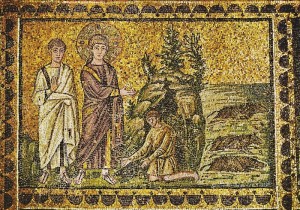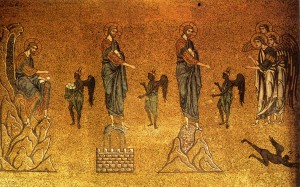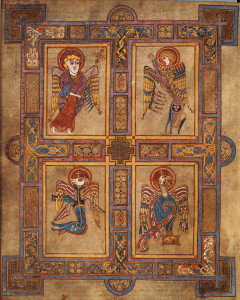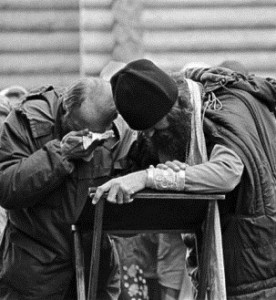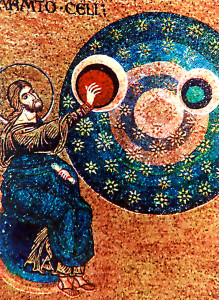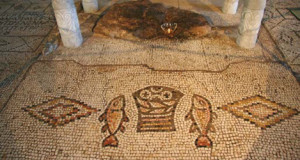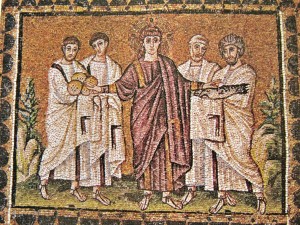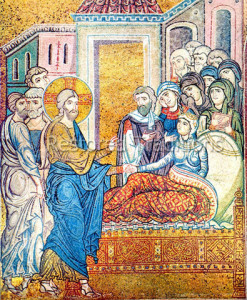17 August OS 2018 – Thursday of the 14th week of Matthew; Afterfeast of the Dormition; S. Myron, Martyr
In today’s Gospel, the Lord casts a legion of demons out of the Gadarene demoniac.
And they came over unto the other side of the sea, into the country of the Gadarenes. And when he was come out of the ship, immediately there met him out of the tombs a man with an unclean spirit, Who had his dwelling among the tombs; and no man could bind him, no, not with chains: Because that he had been often bound with fetters and chains, and the chains had been plucked asunder by him, and the fetters broken in pieces: neither could any man tame him. And always, night and day, he was in the mountains, and in the tombs, crying, and cutting himself with stones. But when he saw Jesus afar off, he ran and worshipped him, And cried with a loud voice, and said, What have I to do with thee, Jesus, thou Son of the most high God? I adjure thee by God, that thou torment me not. For he said unto him, Come out of the man, thou unclean spirit. And he asked him, What is thy name? And he answered, saying, My name is Legion: for we are many. And he besought him much that he would not send them away out of the country. Now there was there nigh unto the mountains a great herd of swine feeding. And all the devils besought him, saying, Send us into the swine, that we may enter into them. And forthwith Jesus gave them leave. And the unclean spirits went out, and entered into the swine: and the herd ran violently down a steep place into the sea, (they were about two thousand;) and were choked in the sea. And they that fed the swine fled, and told it in the city, and in the country. And they went out to see what it was that was done. And they come to Jesus, and see him that was possessed with the devil, and had the legion, sitting, and clothed, and in his right mind: and they were afraid. And they that saw it told them how it befell to him that was possessed with the devil, and also concerning the swine. And they began to pray him to depart out of their coasts. And when he was come into the ship, he that had been possessed with the devil prayed him that he might be with him. Howbeit Jesus suffered him not, but saith unto him, Go home to thy friends, and tell them how great things the Lord hath done for thee, and hath had compassion on thee. And he departed, and began to publish in Decapolis how great things Jesus had done for him: and all men did marvel. – Mark 5: 1-20
A legion in the Roman army at full strength numbered 6,000 men. This man’s being possessed by a “legion” of demons means, therefore, that there were thousands of demons inside of him. How could this be? St. Theophan the Recluse explains:
“My name is Legion: for we are many (Mark 5:9).” Spirits are bodiless, and therefore they do not fill or take up space like bodies. This explains why it is physically possible for many spirits to reside in one person. That it is possible morally for spirits to do this is understandable from their amorality or their absence of all moral principles. That it is possible for people is understandable from their many-sided contact with the dark realm of the unclean powers, due to the way people’s souls are ordered. But this only explains what is possible; the reality of demonic possession is subject to conditions which we do not have the ability to determine. We can only say that spirits do not always enter in a visible way, and possession is not always demonstrated through the possessed person’s actions. There is an unseen, hidden demonic possession. There is also a power of spirits over minds, apart from the body, when the demons lead them wherever they wish, through the passions working in them. People think that they are acting themselves, but they are actually the laughingstocks of unclean powers. What can we do? Be a true Christian, and no enemy power shall overcome you. – Thoughts for Each Day of the Year, pp. 186-187
Today acts of demonic evil invade our minds daily through mass media: endless wars presented as entertainment, mass shootings, children murdering their parents, parents murdering their children, men who say they are women, women who say they are men, and so forth, not to mention the everyday legally sanctioned and publicly funded satanic rites of abortion and sodomy. Of course, apart from the power of true Faith and Baptism, man has always been prey to his passions and to demonic influence working through his passions and sometimes even possessing him bodily. During the long period of the Church’s direct or indirect influence on society, however, she kept the demonic influence in check. Now, after 200 years of open apostasy by the formerly Christian nations, a tide of demonism engulfs all the world, and, humanly speaking, there is no end in sight. We need not fear it, for we belong to Christ. But we need to be vigilant and to take action. We do not throw ourselves off a cliff and ask angels to catch us.
It is critical, indeed a matter of spiritual (and perhaps physical) life and death, to cut out demonic influences in our lives and the lives of those for whom we are responsible, chiefly our children. One does not exaggerate in saying that demonic mental programming, either overt or hidden, pervades contemporary movies, television, and video games in the form of hypnotic and addictive imagery, initiatory verbal formulas, occult symbols, and ritual actions. That decent people still exist who produce benign “entertainment” is a possibility – I hope a probability – but sifting through a pile of toxic waste to find something that will not kill you is a time-wasting and risky process. Are there not better things to do with our time? If something is not obviously helpful or at least harmless, then just cut it out.
And what about the Internet? Here I am, using it, to get this message across. The answer is simple – use it as a tool, for a limited time each day, but do not live in it as an alternate universe. If it gives you access to good things – good books, good articles, good videos – great! Thank God we now have such access to many good things that were previously unavailable, and, providentially, this technology has enabled ordinary people to break the occult elite’s monopoly on communications media. But, as we all know, one has to practice enormous discipline and discernment. Keep track of your time on the Internet for a few days: How many hours did you spend on useless activity, when you could have been doing something else? How many temptations arose? If there were x number of obvious temptations, how many subliminal or unnoticed ones also entered your mind? Who knows? Be careful. I suggest you keep an icon right there in front of you while you are on your Internet device, and always say a prayer before you turn it on. I have not yet seen an Euchologion prayer for blessing online devices, but we certainly should have one which includes an explicit exorcism. I should ask the bishop about it.
As for children: Children do not need and most often will be harmed by video games, television, the computer, and the “smart” phone. Be strict. You will save their minds. They will probably have to use computers when they grow older, of course (unless the catastrophe we deserve does strike, and those who are left will be forced to spend all their waking hours growing food and finding potable water.) But no one needs to learn how to use computers in childhood. Young people can learn what they need to get started on computers in one semester very cheaply before they go to college or – preferably for most – before they get married at a traditional age and start their own families debt-free, supporting themselves with skilled productive work. If your children go to the “public” schools or “progressive” private schools that are replacing the book with the screen, take them out. Why should you let strangers turn your child into an idiot?
As for walking around staring at one’s portable telephone all day long – this is psychic, not to mention spiritual, suicide. (It could actually be physical suicide, when, for example, you are run over by an overwrought Uber driver because while crossing the street you were tweeting, urbi et orbi, a photograph of the friends you met at lunch.)
The good news is that, apart from what our job forces us to, we simply do not need all this stuff. There are precious and few hours in the day. The time we do not have to spend at income-producing work should be spent in wholesome activity: prayer with the family, reading good books both spiritual and secular, singing good songs both spiritual and secular, taking walks, growing vegetables and taking care of animals, working around the house, and on and on. There is a long list of good things that our recent ancestors spent their time on that have nothing to do with television, radio, video games, the Internet, professional sports, or the popular music industry. Nearly all of these “old” activities, in some form – which are not outdated but in fact perennial and alive – are still available to us. As they say, “Just do it.”
The further and ultimate Good News is that we are not the hopeless, helpless slaves of this dystopian anti-Paradise, this prison of the mind, this mindless hive of contented monkey-descended sensualists that the rulers of the satanic world-state are this moment constructing in plain sight before us. We are children of God, citizens of the Heavenly Jerusalem, and members of the Body of Christ. By Faith and Baptism, the Lord has freed us forever from service to Satan, whom we renounced at Holy Baptism, along with “…all his works, all his service, and all his pride.”
“Alright, I agree,” you might be thinking. “But what can I do? I am already enmeshed in x, y, or z you have just described.”
I shall respond with what St. Theophan says above: “What can we do? Be a true Christian, and no enemy power can overcome you.” As Orthodox Christians who are actually orthodox and not just “Orthodox,” we will spend our time in prayer, in good works for others, and useful occupations. We will prefer to use our leisure time in wholesome reading and wholesome activities that are skilled and productive, or driving old ladies to the grocery store, or teaching a child to read, or visiting the sick, or helping a priest start a new mission, or teaching catechism at our parish, or starting a spiritual book discussion group for our friends…or…or – you know the list is endless. If you do not have the strength to give up this or that in order to do better things, confess it with tears and do not justify it, keep praying for the strength to change, get advice from others who have made the switch (or never had to), and talk about your concerns with Orthodox brethren or just other decent people who are also struggling to convert their priorities.
The Lord desires our conversion and salvation more than we do. As they say, “Just do it.” Let us make the Sign of the Cross and charge ahead.
